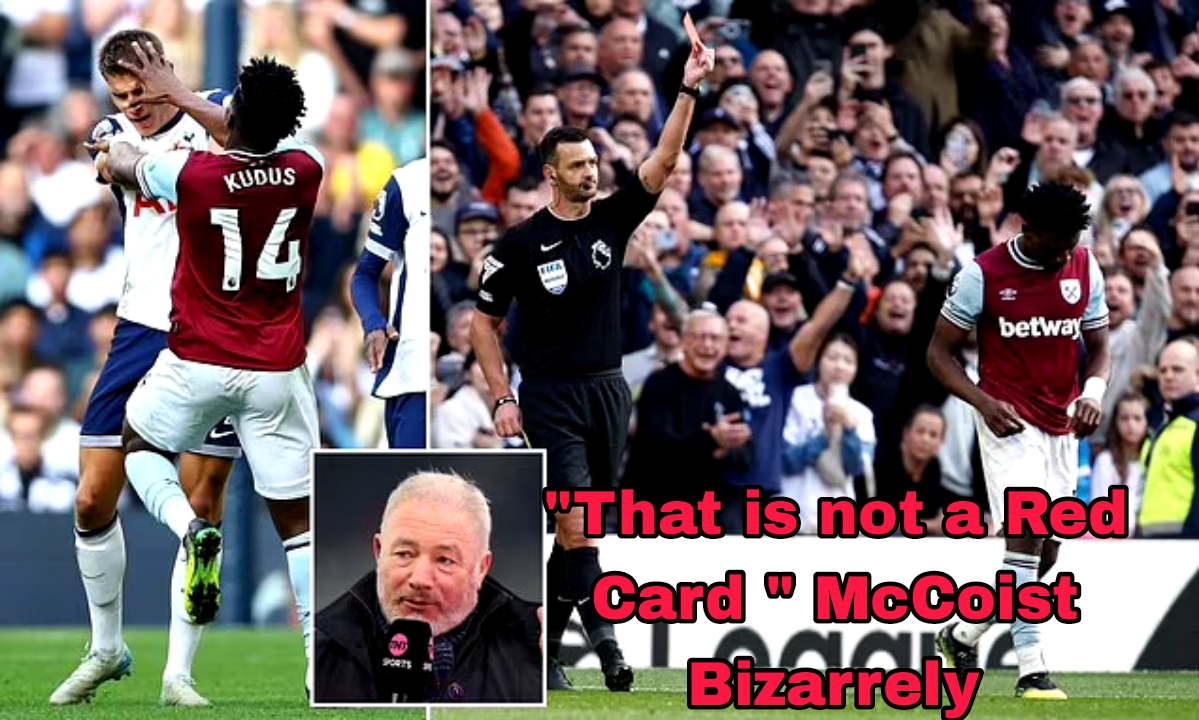In a highly charged London derby, Ally McCoist came to the defense of Mohammed Kudus, asserting that the West Ham midfielder did not deserve a red card despite a moment of indiscretion on his part. The match, held at the Tottenham Hotspur Stadium, began with an exhilarating start for West Ham as Kudus found the back of the net early, putting the visitors in a promising position. However, the excitement was short-lived, as Tottenham’s Dejan Kulusevski equalized just before halftime, leveling the score and shifting the momentum.
As the second half commenced, Spurs emerged with renewed vigor, a change that could be attributed to manager Ange Postecoglou’s tactical adjustments. Replacing James Maddison with Pape Matar Sarr seemed to reinvigorate the home side, which quickly translated into goals. Yves Bissouma scored the first of a quick series, giving Tottenham the lead. This was soon followed by an own goal from West Ham’s Alphonse Areola, who inadvertently deflected the ball into his own net, doubling Spurs’ advantage. The rout was completed by Son Heung-min, who scored on the hour mark, leaving West Ham in a deep hole.
Throughout the match, the tension on the pitch escalated, particularly for the West Ham players as they struggled to regain their footing. Frustrations boiled over in the closing stages, culminating in Kudus reacting angrily during a confrontation with Tottenham’s Micky van de Ven. In a moment of recklessness, Kudus kicked out at van de Ven as they battled for the ball. The referee initially deemed this worthy of a yellow card, but the situation quickly escalated when Kudus slapped van de Ven during the ensuing melee.
This incident caught the attention of VAR, which intervened and prompted a review of the referee’s initial decision. After consulting the footage, the referee opted to upgrade Kudus’s punishment to a red card, sending him off the pitch and leaving West Ham a man down. This decision sparked a debate among commentators and fans alike, with McCoist expressing his disappointment at the outcome.
“I have to admit, I’m probably a bit old-school,” McCoist stated during his commentary on TNT Sports. “Just give him a booking and let’s keep the game moving.” His comments reflect a traditional perspective on football, where the flow of the game is prioritized over strict enforcement of disciplinary actions, especially in the heat of a rivalry match.
The incident highlighted a broader discussion surrounding the role of VAR in modern football. Many supporters and pundits have debated whether such technology enhances the game or disrupts its natural rhythm. In Kudus’s case, some argue that a yellow card would have sufficed, allowing the game to continue without further interruption. Others contend that player safety and maintaining discipline on the field are paramount, making VAR’s intervention justified.
This London derby not only showcased the intensity and rivalry inherent in such matches but also illustrated the fine line players must tread between competitiveness and discipline. West Ham’s hopes for a comeback were severely hampered by Kudus’s dismissal, ultimately affecting their performance and morale.
As the final whistle blew, the implications of the match extended beyond just the scoreline. For West Ham, the loss represented a setback in their campaign, while Tottenham celebrated a crucial victory that could bolster their position in the league. The incident involving Kudus will likely be a topic of discussion for some time, reflecting the complexities of football and the evolving nature of its officiating. As fans and analysts continue to dissect the match, it serves as a reminder of the passion, unpredictability, and sometimes controversy that defines the beautiful game.
